|
|
|
Sort Order |
|
|
|
Items / Page
|
|
|
|
|
|
|
| Srl | Item |
| 1 |
ID:
126196
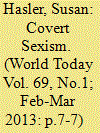

|
|
|
| 2 |
ID:
189955
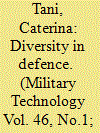

|
|
|
| 3 |
ID:
171116
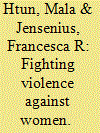

|
|
|
|
|
| Summary/Abstract |
In the 1990s and 2000s, pressure from feminist movements and allies succeeded in pushing scores of states to reform their laws to prevent and punish violence against women (VAW). Even in states with progressive legislation, however, activists face challenges to induce citizens to comply with the law, compel state authorities to enforce the law, and ensure the adequate allocation of resources for social support services. In this essay, we take stock of legislative developments related to VAW around the world, with a focus on the variation in approaches toward intimate partner violence and sexual harassment. We analyze efforts to align behavior with progressive legislation, and end with a discussion of the balance activists must strike between fighting VAW aggressively with the carceral and social support dimensions of state power, while exercising some restraint to avoid the potentially counterproductive effects of state action.
|
|
|
|
|
|
|
|
|
|
|
|
|
|
|
|
| 4 |
ID:
152318


|
|
|
|
|
| Summary/Abstract |
This article considers the experiences of 12 U.S. Army women combat veterans. These women served in historically significant roles as some of the first women to officially serve in combat in the U.S. military. This article focuses on the role of gender in these women’s experiences in the context of the masculine culture of the military. We explore how they used performance of masculinity and metaphors of family to fit into their combat units. We also deliberate on how sexual harassment was used against these women in ways that communicated that they were not fully accepted. Finally, we consider the tension between empowerment and disempowerment in these women’s narratives of their military service.
|
|
|
|
|
|
|
|
|
|
|
|
|
|
|
|
| 5 |
ID:
167829
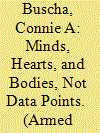

|
|
|
|
|
| Summary/Abstract |
Harris, McDonald, and Sparks’s recent quantitative research article, Sexual Harassment in the Military: Individual Experiences, Demographics, and Organizational Contexts, does not deliver its title’s promises. In 2018, social science research investigating, describing, and, ultimately, impacting human lives has advanced beyond overly simplistic figures of data points on x- and y-axes and rhetorical findings. Therefore, this response challenges numerous aspects of Harris, McDonald, and Sparks’s article. It identifies pragmatism as a valuable theoretical perspective from which to investigate the phenomenon of sexual harassment in the military. It further asserts that a qualitative methodology best provides rich, nuanced, and descriptive data from which researchers and scholars can identify measures to mitigate negative experiences for all service members regardless of gender.
|
|
|
|
|
|
|
|
|
|
|
|
|
|
|
|
| 6 |
ID:
106291


|
|
|
|
|
| Publication |
2011.
|
| Summary/Abstract |
The fourth European Working Conditions Survey carried out in the autumn of 2005 across 31 countries, including the 27 EU member states by the European Foundation for the Improvement of Living and Working Conditions revealed the seriousness of the problem in Turkey, which ranks third among the 31 countries surveyed for incidents of sexual harassment. Sexual harassment in the workplace in Turkey has come under spotlight recently with the rapid emergence of such claims, publication of studies and surveys, passing of EU acquis compatible laws and governmental circulars offering expanded protection against workplace harassment. These developments are expected to create an awareness and an increase in the already growing number of harassment-related lawsuits in Turkey that may help to reduce widespread silence on the matter.
|
|
|
|
|
|
|
|
|
|
|
|
|
|
|
|
| 7 |
ID:
184518


|
|
|
|
|
| Summary/Abstract |
Political scientists have recently taken great strides to expose and address sexual harassment and assault in our academic departments and professional conferences. Little has been said, however, of the sexual violence and discrimination that political scientists confront during field research. Female field researchers may encounter a number of power disparities that put them at acute risk for sexual violence during fieldwork, and evidence suggests that experiences of sexual misconduct in the field are both pervasive and professionally devastating. This article challenges the discipline to break its silence on sexual violence during fieldwork, remove the stigma of incompetency assigned to survivors, and support field researchers in confronting sexual harassment and assault in the field.
|
|
|
|
|
|
|
|
|
|
|
|
|
|
|
|
| 8 |
ID:
157491
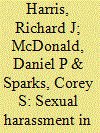

|
|
|
|
|
| Summary/Abstract |
Sexual harassment remains a persistent problem in the U.S. military despite extensive research and policy initiatives. Theoretical explanations identify individual circumstances (e.g., power differentials) and organizational factors (e.g., climate, culture). However, data constraints limit the capacity to link individual contexts with independent measures of environments.
|
|
|
|
|
|
|
|
|
|
|
|
|
|
|
|
| 9 |
ID:
091694


|
|
|
| 10 |
ID:
171118
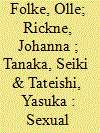

|
|
|
|
|
| Summary/Abstract |
Sexual harassment is more prevalent for women supervisors than for women employees. This pattern holds in the three countries we studied – the United States, Japan, and Sweden – where women supervisors are between 30 to 100 percent more likely to have been sexually harassed in the last twelve months. Among supervisors, the risk is larger in lower- and mid-level positions of leadership and when subordinates are mostly male. We also find that harassment of women supervisors happens despite their greater likelihood of taking action against the abuser, and that supervisors face more professional and social retaliation after their harassment experience. We conclude that sexual harassment is a workplace hazard that raises the costs for women to pursue leadership ambitions and, in turn, reinforces gender gaps in income, status, and voice.
|
|
|
|
|
|
|
|
|
|
|
|
|
|
|
|
| 11 |
ID:
162664


|
|
|
| 12 |
ID:
092435


|
|
|
| 13 |
ID:
187424
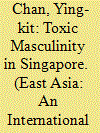

|
|
|
|
|
| Summary/Abstract |
The #MeToo Movement, which originated in the USA against sexual harassment and violence, has caught on in Singapore. This article suggests that the recent debate on toxic masculinity in the country, brought to public attention in a speech by Corinna Lim, chief of the Association of Women for Action and Research (AWARE), is an extension of the #MeToo Movement. The debate on toxic masculinity has largely revolved around the issue of whether the mandatory National Service (NS), which all Singaporean men have to perform, is a site of toxic masculinity. This article is a preliminary attempt to connect the dots and examine the implications of the debate for civil society, NS, and women’s activism in contemporary Singapore.
|
|
|
|
|
|
|
|
|
|
|
|
|
|
|
|
| 14 |
ID:
161665
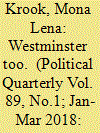

|
|
|
|
|
| Summary/Abstract |
At the end of 2017, millions of women used the #MeToo hashtag to draw attention to widespread sexual harassment and assault around the world. In British politics, female politicians, staff members, and journalists opened up about their own experiences, provoking the resignation and party suspension of a number of male Cabinet ministers and Members of Parliament. This article explores how this issue got on the political agenda, what features of politics might foster harassment and discourage reporting, and what solutions might be pursued to tackle this problem. It argues that sexual harassment should be understood as a systemic, cultural problem, rather than a question of problematic individuals. Ignoring the issue of sexual harassment in politics, the article concludes, has serious consequences for gender equality—as well as for democracy itself, reducing policy effectiveness, distorting the political pipeline, and diminishing political transparency and accountability.
|
|
|
|
|
|
|
|
|
|
|
|
|
|
|
|
|
|
|
|
|